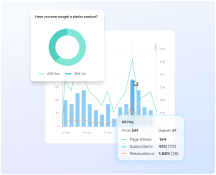The board game industry has seen a resurgence in popularity, blending traditional gameplay with innovative technology to create a vibrant and competitive market. For board game creators, understanding the complexities of market research within this niche is crucial. This blog post will explore the unique aspects of board game market research, offer a step-by-step guide on conducting it, highlight useful tools and resources, and share insights through a case study on GoChess, Kickstarter’s most funded chess campaign.
What Makes Market Research for the Board Game Industry Unique?
The board game industry has some unique quirks when it comes to market research, compared to other sectors. Here’s a breakdown of what sets it apart:
Passionate Fanbase
Board game enthusiasts are incredibly passionate about their hobby. This can be a double-edged sword. On the one hand, they’re more likely to participate in surveys and focus groups, providing rich qualitative data. But it also means they might be more critical and hold games to a higher standard than the average consumer.
Diverse Market
The board game market caters to a wide range of demographics and interests. Unlike, say, the video game industry, there’s no single “gamer” profile. You’ve got casual players, hardcore strategists, family game nights, party games, and everything in between. This means research needs to segment the audience effectively to understand preferences.
Constant Innovation
The industry is constantly churning out new ideas and mechanics. Unlike established industries with well-defined product categories, board games can be highly thematic and innovative. This makes it challenging to predict trends and requires researchers to stay on top of the latest developments.
Community Influence
Board game reviewers, bloggers, and online communities wield significant power. Positive word-of-mouth recommendations can make or break a game’s success. Research needs to consider how to tap into these communities and understand their preferences.
Physical vs. Digital
The rise of online board game platforms adds another layer of complexity. While the core experience remains physical for many, the digital aspect influences purchasing decisions and play patterns. Research needs to account for both aspects.
By understanding these unique characteristics, businesses in the board game industry can conduct more effective market research and make data-driven decisions to develop and launch successful games.
How to Do Board Game Market Research [Step-by-Step Guide]
Whether you’re a seasoned game designer or an entrepreneur with a board game idea, thorough market research is crucial for success. Here’s a breakdown of the steps involved:
1. Define Your Goals & Target Audience
Start with the “Why?”: Are you researching for a specific game idea, a new market segment, or the industry as a whole? Knowing your goals helps tailor the research.
Identify Your Target Players: Who are you designing for? Casual families? Hardcore strategy enthusiasts? Budget-conscious gamers? Demographics, interests, and play styles all matter.
Example: Imagine you’re developing a cooperative adventure game. Research might involve understanding player preferences for cooperative mechanics, popular adventure themes, and price points for similar games targeted at families.
2. Conduct Secondary Research
Industry Reports & Data: Look for reports on the board game market size, growth trends, and popular genres. The NPD Group, IBISWorld, and Euromonitor are good starting points.
Board Game Websites & Blogs: Sites like BoardGameGeek and Dice Tower offer news, reviews, and insights into player preferences.
Social Media & Online Communities: Join Facebook groups, Reddit forums, and Discord servers dedicated to board games. Observe discussions and identify trending topics. (See the tools and resources section for a full list.👇
Example: Industry reports might reveal a growing demand for cooperative games. BoardGameGeek forums might show discussions on under-represented themes in the genre, sparking your adventure game concept.
3. Conduct Primary Research
Surveys & Questionnaires: Craft online surveys or paper questionnaires to gather data on player demographics, preferred mechanics, and purchasing habits. Tools like Google Forms or SurveyMonkey can help.
Focus Groups & Interviews: Gather a small group of players representing your target audience. Discuss game preferences, likes/dislikes of existing games, and brainstorm ideas.
Pro tip: To expedite your time and efforts consider using primary research platforms like Prelaunch.com that cross qualitative and quantitative methods. The platform lets you quickly build an idea-validating campaign that gives you insights from embedded surveys. (Focus groups are also refined when you run a campaign using this tool. The team behind the platform will conduct in-depth interviews with a select group of people who have already confirmed their intent to buy. Learn more about the platform’s focus groups here.)
Playtesting: This is crucial! Get your game prototype in front of potential players and observe their gameplay experience. Gather feedback on mechanics, theme, and overall enjoyment.
4. Analyze & Interpret Results
Quantitative Data: Look for trends and patterns in survey responses. Identify popular themes, mechanics, and preferred game lengths within your target audience.
Qualitative Data: Analyze feedback from focus groups and playtesting. Note recurring themes in player comments and identify areas for improvement in your game concept.
Example: Survey results might show a strong preference for fantasy adventure themes within your target audience. Focus group feedback might highlight a desire for more player interaction and strategic depth. Playtesting might reveal rule ambiguities or imbalances that need tweaking.
Pro tip: Sometimes finding the “why” may not be so easy. That’s why Prelaunch helps you analyze and interpret your data by segmenting out the “reasons for interest” as well as noting any objections potential customers had when they interacted with your product virtually on the prelaunch landing page.
5. Refine & Action
Develop a Market Positioning Strategy: Based on your research, how will your game stand out in the market? What unique selling proposition (USP) will attract your target audience?
Inform Game Design Decisions: Use research insights to refine your game concept, mechanics, and theme to better align with player preferences.
Pro tip: This step is also made easy on Prelaunch. Once you’ve made alterations to your product (even if it’s just visual), fine-tuned your message, and formulated all the advantages it has to offer, you can make those tweaks and re-run your concept validation campaign on Prelaunch to confirm you’re on the right track.
By following these steps and keeping the unique aspects of the board game market in mind, you’ll be well-equipped to conduct effective market research and develop a game that resonates with your target audience.
Tools and Resources for Board Game Market Research
Surveys and Feedback Tools: Platforms like SurveyMonkey and Typeform can facilitate customer feedback collection.
Social Listening Tools: Use Mention or Brandwatch to monitor what’s being said about board games in your category.
Facebook Groups:
- Board Game Spotlight
- Board Game Revolution
- Board Game Exchange
- Board Game Geek Community
- Board Game Trading and Chat
Reddit Forums (Subreddits):
Discord Servers:
- Tabletop Simulator Discord
- The Board Game Sanctuary
- The Board Game Server
- Tabletop Game Playtesters Guild
These communities are great places to discuss board games, share recommendations, learn about new releases, and connect with other enthusiasts!
Market Analysis Platforms: SimilarWeb offers insights into market trends and competitor performance. Also, use Prelaunch’s AI Market Research Assistant to analyze thousands of reviews and feedback from your competitors. This gives you access to a summarized version of top customer praises and complaints, a great place for insight!–
Case Study: GoChess- Kickstarter’s Most Funded Chess Campaign Validated Its Price on Prelaunch.com
GoChess, created by Particula, showed how effective prelaunch strategies and market validation could lead to record-breaking success on crowdfunding platforms. Through utilizing Prelaunch.com, the team was able to:
Build an Informative Landing Page: Highlighting GoChess’s unique features, such as its fully robotic mechanism and AI technology, helped set clear expectations for potential backers.
Understand the Right Market: Targeted social media ads revealed significant interest in key markets including the UK and USA, especially among tech-savvy professionals.
Validate the Price Point: By testing different pricing strategies, GoChess found the optimal launch price that balanced profitability with consumer willingness to pay, proving the value of iterative testing in pricing validation.
This approach not only validated their strategy but also set GoChess on the path to becoming a massively successful campaign.
Overcoming Market Research Challenges in the Board Game Industry
Even with a well-defined plan, there are some hurdles you might face when delving into board game market research. Here are some common challenges and how to address them:
Niche Preferences & Fragmented Audience
The board game market caters to a wide range of interests, making it hard to get a one-size-fits-all answer. A single survey might not capture the nuances of hardcore strategy gamers vs. casual family players.
Solution: Segment your research. Tailor surveys and focus groups to specific demographics and interests. Look for online communities dedicated to your target niche to gather focused insights.
Hype vs. Reality
Passionate fans can be overly enthusiastic in surveys or focus groups, inflating interest in a particular theme or mechanic.
Solution: Rather than paying passers-by to participate in a survey, on Prelaunch, users pay to give their opinion. Using a proprietary Prelaunch Reservation Funnel, visitors leave a small deposit to reserve future innovations. This act of taking out a credit card and making an online payment is the best indicator of real purchase intent ever. It changes everything in terms of the insights you get.
Access to New & Upcoming Games
It can be difficult to get prototypes or early versions of games for playtesting, especially from smaller publishers.
Solution: Connect with game designers and publishers at industry conventions or online forums. Attend playtesting events or meetups to get access to a wider range of games. Consider running online playtesting sessions using tools like Tabletop Simulator. (Here’s a quick list of conventions to start👇)
- E3: One of the largest gaming expos globally, featuring announcements, presentations, and demos from leading game developers and publishers.
- Gamescom: Europe’s largest gaming event, showcasing upcoming games, industry trends, and networking opportunities for developers, publishers, and gamers.
- PAX (Penny Arcade Expo): A series of gaming festivals held annually in multiple locations, including PAX East, PAX West, PAX South, and PAX Australia. Each event features exhibitions, panels, tournaments, and community activities.
- GDC: The largest annual event for professionals in the video game industry, focusing on game development, programming, design, and business strategies.
- BlizzCon: Organized by Blizzard Entertainment, BlizzCon is a celebration of Blizzard games, including titles like World of Warcraft, Overwatch, and Diablo. The event features announcements, tournaments, and community activities.
- QuakeCon: An annual gaming convention dedicated to the Quake series of video games, organized by Bethesda Softworks. The event includes tournaments, exhibitions, and developer panels.
- DreamHack: A series of gaming festivals featuring esports tournaments, LAN parties, cosplay competitions, and gaming exhibitions held worldwide.
- EGX (formerly Eurogamer Expo): The UK’s biggest gaming event, showcasing upcoming games, indie titles, and esports tournaments.
- BGS: The largest gaming event in Latin America, featuring game launches, esports competitions, and industry networking opportunities in São Paulo, Brazil.
Cost & Time Constraints
Conducting thorough market research can be expensive and time-consuming, especially for smaller companies or independent designers.
Solution: Be resourceful! Utilize concept validating tools like Prelaunch that combine surveys, price validation, integration testing and position testing all in one. Tools like these offer you a comphrehesive breakdown of what users loved, why they loved it, what they would like to see more of and what you can afford to lose. The goal is to launch the best version of your product and set you up for success.
Keeping Up with Trends
The board game industry is constantly evolving, with new mechanics and themes emerging all the time.
Solution: Stay plugged into the community! Follow industry blogs, board game reviewers, and online communities to stay updated on the latest trends. Attend industry conventions and events for firsthand exposure to new ideas.
Conclusion
Board game market research is a vital component of the game development process, offering insights that can significantly influence a game’s design, marketing, and sales strategies. By understanding their unique market and audience, creators can position their board games for success in a competitive landscape.
FAQ (PAA Questions)
What is board game market research?
Board game market research involves gathering, analyzing, and interpreting data about the board game industry, competition, and target market to make informed decisions about game development and marketing.
Who should be conducting board game market research?
There are several parties who might benefit from conducting board game market research:
- Game designers and publishers: Understanding market trends can help them develop games that are more likely to be successful.
- Retailers: Knowing what types of games are in demand can help them stock their stores appropriately.
- Investors: Market research can help investors identify promising opportunities in the board game industry.
- Industry analysts: They use market research data to track industry trends and provide insights to businesses.
What types of market research are most appropriate for the board game industry?
Primary research (such as surveys and focus groups) and secondary research (including industry reports and competitor analysis) are crucial for gaining insights into the board game market. Additionally, prelaunch campaign analysis, as shown with GoChess, can offer valuable data on market receptiveness and pricing strategies.
By employing a combination of traditional strategies and innovative approaches like those used by Particula for GoChess, board game creators can uncover the insights needed to succeed in today’s vibrant market.




